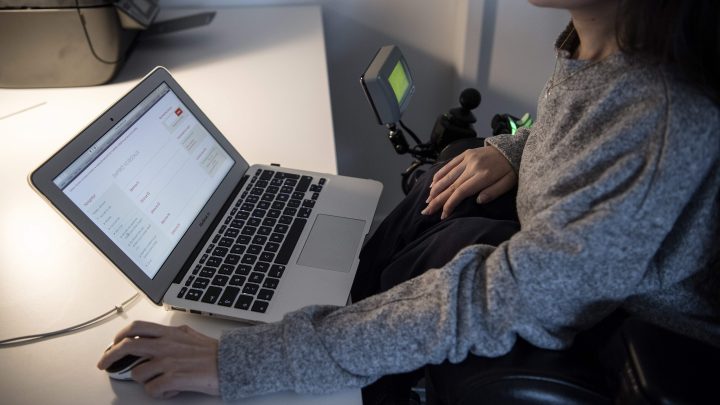
Job gains for people with disabilities are outpacing those for other groups, thanks to telework
Job gains for people with disabilities are outpacing those for other groups, thanks to telework

At the beginning of the pandemic, workers with disabilities and those without lost jobs in equal numbers. But in 2021, the employment recovery for people with disabilities began to outpace the recovery of those without.
Nicole Maestas, a Harvard professor and director of the National Bureau of Economic Research’s Retirement and Disability Research Center, joined Marketplace’s Kai Ryssdal to talk about what the employment outlook is for workers with disabilities. An edited transcript of their conversation is below.
Kai Ryssdal: What usually happens to people with disabilities, first of all, when the economy slows down or when a recession hits? What happens?
Nicole Maestas: Usually people with disabilities are hit the hardest. So their employment rates decline the most, and they take the longest to turn around and actually start recovering.
Ryssdal: Give me a “for instance.” What did 2008 mean for people with disabilities?
Maestas: Well, for people with disabilities, their recovery lagged for a couple of years after 2008, but sometime around 2011, they started gaining ground. And actually, this was pretty important, because this was the first time in decades that people with disabilities had actually seen their employment rates rise and begin to close that gap between people with and without disabilities.
Ryssdal: OK, so let’s fast forward to today. We’ve just come through a pandemic, late-stage, shall we say. There was the initial economic crash, I think we can safely say. So what has the recovery been like for people with disabilities?
Maestas: Well, two things happened: First of all, instead of people with disabilities losing more jobs than people without disabilities, they were hit about the same. So both groups lost about 10% of employment and they recovered roughly apace for a little while. But then, at some point in the middle of 2021 — so about a year in — people with disabilities saw their recovery begin to outpace the recovery of people without disabilities.
Ryssdal: OK, so here’s the payoff pitch: Why? What happened?
Maestas: So first of all, people with disabilities gained across the board, across all occupations. But where was the growth concentrated? In teleworkable occupations.
Ryssdal: Well, say more about that. How specifically do people with disabilities have the advantage there?
Maestas: Well, people with disabilities have long asked for telework as a reasonable accommodation. And you know, before the pandemic, employers were hesitant, and then, you know, enter the pandemic. And it turns out, lots of jobs can be done from home. And, sure enough, this really appears to have been kind of a silver lining of the pandemic for people with disabilities, where they have come into the labor market to take jobs, particularly as this recovery has resulted in a tight labor market.
Ryssdal: Yet here’s the thing, the labor market will not always stay this tight. And we don’t actually know what the structural change to people going into the office or working from home will be like, so — as the person who studies this — are you hopeful that people with disabilities will maintain some kind of advantage in this area?
Maestas: So you know, I should say that I had been very, very worried. The gains that we saw coming out of the Great Recession really did persist. And then, you know, the pandemic hits, and it’s anybody’s guess what’s going to happen. And it’s been quite remarkable, in fact, that people with disabilities have, you know, turned out to be not hit as hard and have actually seen greater improvement. So I think it’s entirely possible that we could have sustained gains in the future. Some of this, of course, does depend upon what employers do. I mean, that part, I guess, is really anybody’s guess. But we now know that it can be done.
Ryssdal: You sound pleasantly surprised.
Maestas: Well, I am pleasantly surprised. I mean, I was really, really quite worried that all that gain would be just erased. We know what’s happened in the past. I mean, never has there really been a recession that hasn’t hit people with disabilities harder than people without disabilities. So it’s quite possible that the nature of this one was such that they were able to benefit.
There’s a lot happening in the world. Through it all, Marketplace is here for you.
You rely on Marketplace to break down the world’s events and tell you how it affects you in a fact-based, approachable way. We rely on your financial support to keep making that possible.
Your donation today powers the independent journalism that you rely on. For just $5/month, you can help sustain Marketplace so we can keep reporting on the things that matter to you.

















